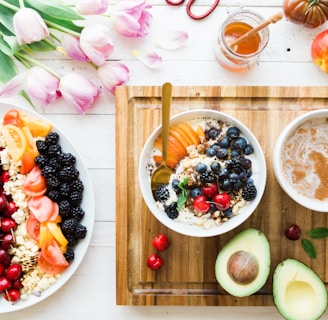Vegetarian vs. Vegan vs. Non-Vegetarian Diets: A Complete Guide
HEALTH AND WELLNESS
Tarun Mehta
7/11/20254 min read


Vegetarian vs. Vegan vs. Non-Vegetarian Diets: A Complete Guide
Food is more than just sustenance; it is a lifestyle choice, a cultural identity, and a significant factor in health and well-being. With various dietary preferences gaining popularity, people often wonder: What is the difference between vegetarian, vegan, and non-vegetarian diets? Which one is healthier? What should you watch out for in each? Let us break it all down and explore the world of food choices.
1. Understanding the Diets
Vegetarian Diet - A vegetarian diet allows plant-based foods along with some animal byproducts like dairy and eggs (in certain cases) while it excludes products like meat, poultry, and seafood. There are diverse definitions of vegetarian diets depending on diverse cultures and believes:
Lacto-vegetarian – Includes dairy but avoids eggs and meat.
Ovo-vegetarian – Includes eggs but excludes dairy and meat.
Lacto-ovo vegetarian – Includes both eggs and dairy but excludes meat.
Pescatarian – Excludes meat and poultry but includes fish. A lot of cultures do not consider this vegetarian.
Vegan Diet - A stricter version of vegetarianism, veganism eliminates all animal-derived products, including dairy, eggs, honey, and even products made using animal byproducts (like gelatin). It focuses entirely on plant-based foods.
Non-Vegetarian Diet - This includes meat, poultry, fish, and all animal products, along with plant-based foods. It is the most traditional diet worldwide, varying significantly based on regional cuisines and personal preferences.
2. Types of Foods in Each Diet
Vegetarian Foods
Fruits & Vegetables – Apples, bananas, spinach, carrots, bell peppers.
Grains & Legumes – Rice, quinoa, oats, lentils, chickpeas, beans.
Dairy Products – Milk, cheese, yogurt, butter (except for ovo-vegetarians).
Eggs – (For ovo-vegetarians).
Plant-Based Proteins – Tofu, tempeh, nuts, seeds.
Vegan Foods
Everything in the vegetarian list except dairy and eggs.
Dairy Alternatives – Almond milk, soy milk, cashew cheese.
Vegan Protein Sources – Seitan, jackfruit, pea protein, lentils.
Healthy Fats – Avocados, olive oil, coconut milk.
Non-Vegetarian Foods
Meats – Chicken, beef, pork, lamb, etc.
Seafood – Fish, shrimp, crab, lobster.
Eggs & Dairy – Common in many non-vegetarian diets.
3. Health Benefits of Each Diet
Each of these diets has unique benefits, depending on food choices and overall lifestyle.
Benefits of a Vegetarian Diet
Heart Health – Studies suggest that vegetarians have lower levels of cholesterol and hence have reduced risk of heart diseases.
Weight Management – These diets are often lower in calories, making it easier to maintain a healthy weight.
Better Digestion—These have high fiber intake from fruits, vegetables, and whole grains, which promotes gut health.
Reduced Risk of Chronic Diseases – These diets lead to decreased risk of high blood pressure, type 2 diabetes, and certain cancers.
Benefits of a Vegan Diet
Eliminates Saturated Animal Fats – These may help with cholesterol levels and overall heart health.
Rich in Antioxidants – More fruits and vegetables mean higher intake of vitamins, minerals, and fiber.
Environmentally Friendly – Vegan diets have the lowest carbon footprint, making them the most sustainable.
Helps with Allergies & Skin Issues – Many people report clearer skin and better digestion after switching to a plant-based diet.
Benefits of a Non-Vegetarian Diet
High-Quality Protein – Animal protein is a complete protein, containing all essential amino acids needed by human body.
Rich in Vitamin B12 & Iron – Non-vegetarian foods are natural sources of vitamin B12, which is often lacking in plant-based diets.
Muscle Growth & Strength – Essential for athletes or those needing higher protein intake.
Greater Food Variety – A balanced mix of plant-based and animal-based foods provides diverse nutrients.
4. Things to Look Out For in Each Diet
While each diet has its perks, there are also some nutritional pitfalls to watch out for.
Challenges of a Vegetarian Diet
Protein Intake – Without meat, it is essential to consume enough plant-based proteins like lentils, tofu, and beans.
Iron Absorption – Plant-based iron is less bioavailable than meat-based iron. Pairing iron-rich foods with vitamin C helps absorption.
Vitamin B12 Deficiency – Primarily found in animal products, this nutrient may require vegetarians to turn to fortified foods or supplements.
Challenges of a Vegan Diet
Deficiency Risks – Vitamin B12, iron, omega-3 fatty acids, and calcium must be carefully planned in a vegan diet.
Social & Dining Challenges – Finding vegan options at restaurants or social events can sometimes be tricky.
Processed Vegan Foods – Many vegan junk foods (like fries, chips, and plant-based fast foods) can be high in sodium and unhealthy fats.
Challenges of a Non-Vegetarian Diet
Higher Cholesterol & Saturated Fats – Red meat and deep-fried meats leads to higher cholesterol levels and can potentially increase the risk of heart disease.
Processed Meat Risks – Regular consumption of processed meats (e.g. bacon, sausages) is linked to cancer risks.
Overeating Proteins – Excessive protein, especially from red meat, can put stress on the kidneys.
5. Ethical & Environmental Considerations
Food choices extend beyond personal health; they impact the environment and animal welfare.
Vegetarian & Vegan Diets
Reduce Carbon Footprint – Animal farming contributes significantly more to greenhouse gas emissions than plant-based diets which require fewer resources.
Animal Welfare – Avoiding animal products supports cruelty-free food production.
Water Conservation – Meat production consumes much more water than growing crops.
Non-Vegetarian Diet
Sustainable Meat Choices – Grass-fed, free-range, and organic meat options reduce environmental impact.
Supporting Ethical Farms – Choosing locally sourced, humane meat can be a more ethical approach.
Balanced Approach – Reducing meat consumption (flexitarianism) can be a middle ground for environmental and ethical concerns.
6. Which Diet is Right for You?
There’s no one-size-fits-all answer. Your ideal diet depends on:
Health Goals – Do you need more protein? Lower cholesterol? Reduce inflammation?
Personal Beliefs – Ethics, sustainability, and animal welfare may influence your choice.
Lifestyle & Convenience – Can you maintain a strict diet while traveling or dining out?
Medical Conditions – Some health issues may require specific dietary changes.
7. The Flexitarian Approach: Best of Both Worlds?
If you are unsure which diet to follow, a flexitarian (semi-vegetarian) approach may work. This involves primarily eating plant-based foods while occasionally consuming meat, making it a balanced and sustainable option.
Final Thoughts
Whether you follow a vegetarian, vegan, or non-vegetarian diet, the key to good health lies in balance, variety, and mindful eating. Prioritize whole, nutrient-rich foods, stay informed about your nutritional needs, and choose what aligns with your body, values, and lifestyle.
Have you tried switching your diet? How has it worked for you? Share your thoughts on our Facebook page, we would love to hear your story.
Video available at: https://youtu.be/IZW1U4qjWRs

Ascend2Elevate
Transform today, Thrive tomorrow
© 2026. All rights reserved.
PS: The content on the website are the author's viewpoint and opinion. Kindly follow any tips or advice at your own discretion and ensure they suit your needs and personal situation. Please check our T&C page for more details (ascend2elevate.com.au/terms-and-conditions)
Office 4074, Ground Floor, 470, St Kilda Rd, Melbourne, VIC-3004, Australia
